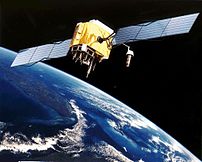Churches have by and large climbed on the digital bandwagon in the past decade. Computers and internet connections are no longer considered luxuries, and most churches have a web presence (or at least feel like they should have one).
But the past two years have seen a rapid acceleration in the adoption of portable computing by the average consumer, and this will inevitably prompt changes by church leaders. Here's my quick take on how one such innovation could be closer to us than we think.
Location, Location, Location
I am impressed with the GPS capabilities expanding to phones. GPS takes advantage of satellite technology so that your device always "knows" where you are. The Apple IPhone has remarkable apps that take advantage of location specifics so that users can find local restaurants, movie theaters, and gas stations -- all based on where they happen to be at that moment.
We can't be too far from inventive congregations creating applications that take advantage of the GPS in these devices.
For example, congregations could allow users to discover church services and other congregational events. GPS devices could allow people to automatically connect with things offered in the area by city, zip code, or mile-radius.
I can imagine the day coming when I visit a city for a conference and can look up services and events (perhaps indexed by religious orientation) and see what is happening religiously in the area -- whether it starts in 12 minutes or in 2 days time. Description, times, and further information would be at my fingertips. And the phone would give me turn-by-turn directions to the place whether by car or on foot.
I can imagine the day coming when I visit a city for a conference and can look up services and events (perhaps indexed by religious orientation) and see what is happening religiously in the area -- whether it starts in 12 minutes or in 2 days time. Description, times, and further information would be at my fingertips. And the phone would give me turn-by-turn directions to the place whether by car or on foot.
 Image via Wikipedia
Image via Wikipedia
This technology does not have to be tailored just for new visitors. Religious organizations could also pre-program their events to actually "begin" as people arrive to services. Because of GPS capabilities, these can automatically begin when a person comes within "range" of the congregation.
Picture this -- users could elect to connect to their congregations either by pre-set time (20 minutes before services or events) or by pre-set radius (within 1 mile of the meeting place) and have music begin to play as a "pre-event" or "pre-service" preparation. Prayers could be read aloud. Readings from scripture, or church history, or a weekly newsletter could be included. And images could be displayed to set mood and ambience.
In fact, announcements could also be programmed to play for users either before or after events.
And for study groups that require some advance reading, these apps could remind people of their assignment (again by time or pre-set location radius) and even allow people to download the required reading right to their phones. Or have it read aloud to them using speech-to-text software as they are traveling.
And for study groups that require some advance reading, these apps could remind people of their assignment (again by time or pre-set location radius) and even allow people to download the required reading right to their phones. Or have it read aloud to them using speech-to-text software as they are traveling.
Expanding the Land-based Local to the Online Global
Connecting all of these services through twitter, facebook, friendfeed, etc., vastly expand the presence of a local congregation.
 Image via Wikipedia
Image via Wikipedia
 Image via CrunchBase
Image via CrunchBase
Inventive programmers in specific congregations could do this right now (if they had the motivation and encouragement from their pastors to do it). Perhaps the initiative of larger networks of denominations or para-church support organizations would commission programmers to create these apps.
However it happens, I guarantee that if such apps are created, they will be implemented in thousands of congregations overnight.
In short, the wired church of the future is just around the corner. The emerging electronic capacities of portable computing and the overwhelming presence of these devices in the consumer world will soon be co-opted by religious organizations.
It only remains for the first set of innovators to create the apps that take advantage of these capacities in religiously creative ways.
It only remains for the first set of innovators to create the apps that take advantage of these capacities in religiously creative ways.





1 comment:
I think technology and religion is just starting to make an impact. I think that technology could make a greater impact than it already is, though, but some churches are reluctant to use it.
Post a Comment